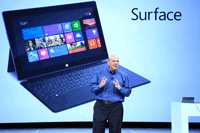Onward and UpwardKeith Ward, Editor in Chief, Visual Studio Magazine
Blog archive
5 Surface Questions for Microsoft
Well, it's certainly a new day for Microsoft, isn't it? Yesterday's announcement of the Surface tablets signals a major shift. Microsoft has decided that being more like Apple isn't a bad thing: making its own hardware to go along with software means complete control of the pipeline.
That also means, of course, additional risk: Microsoft doesn't have a history of rolling its own, so there will undoubtedly be hiccups along the way, as the hard lessons will have to be learned -- lessons Apple has long ago internalized.
Still, I'm impressed by what I've seen. Making both an ARM and Intel version of the tablets is clever, and opens up opportunities that don't exist on the Apple side: the only touchscreen tablet coming out of Cupertino is ARM-based. There are likely to be advantages to having a more desktop-like tablet in addition to a traditional tablet. I like my iPad lots, but there are many times I would like the portability of that with the ability to get more serious work done like I do with a laptop/desktop. The Windows 8 Pro version (which runs the Intel processors) may be just the ticket for me.
One other thing: three huge cheers for the cover/keyboards, both the Touch and Type styles. Not having to buy one means more usefulness and lower cost out of the box.
So, although I'm encouraged by the announcement, the execution is another matter entirely. To that end, I've got some Surface questions for Microsoft:
- How backwards-compatible will Windows 8 Pro be? I don't expect Windows RT to work with traditional Windows 7/XP apps. But the Intel version had better work with them -- and well. One of the key failings of Windows Vista out of the gate was the lack of compatibility. Microsoft can't afford to suffer that kind of catastrophe again.
- How will they be priced? The iPad (v.3) starts at $499, the Kindle Fire at $199. Both of those tablets are market leaders, by a wide swath. And all indications are that Apple's developing a smaller, cheaper iPad version to compete more directly with the Fire. For Microsoft to gain traction, picking the right price point will be beyond crucial -- it could be everything. There could be even be multiple price points: one for RT and another for Windows 8 Pro, which would give customers more options, but not too many options so as to get confused.
- How much time and effort will be spent on the App Hub and Windows Marketplace? More and more, it's becoming clear that good navigation and app discovery technologies, along with reporting ease and timeliness, are crucial in getting developers on board. Google has had lots of issues with its Android Market, and Apple has suffered some slings and arrows in regard to its policy of disallowing apps for competitive or simply incoherent reasons. If any company knows the importance of the ecosystem, it's Microsoft. But Redmond is still getting its legs under it when it comes to this kind of sales channel.
- How will Microsoft market the versions? Will Windows 8 Pro (as I suspect) be touted as the business tablet and Windows RT as the consumer device? Defining the segments will ensure that the waters aren't muddied in the sales channel. Customers should know exactly which tablet they want, and exactly why.
- Will they definitely be out for the holidays? Microsoft says that Windows RT will be out the same time as Windows 8 general availability, with Windows 8 Pro "about 90 days later". So the priority is Windows RT and the consumer market. But no firm date for Windows 8 has been released yet. If it's October, for example, that pushes off Windows 8 Pro until the very end of 2012 or into the early part of next year, when sales typically lag. Will that get it off to a slow start, which is sometimes death in a market often unforgiving of latecomers?
There's a long way to go, and these questions will need to be answered in the positive for Microsoft to pick up some mobile mojo.

[Click on image for larger view.] |
Posted by Keith Ward on 06/19/2012